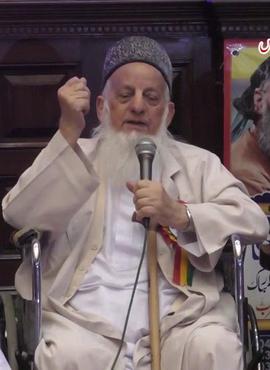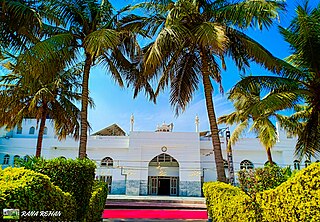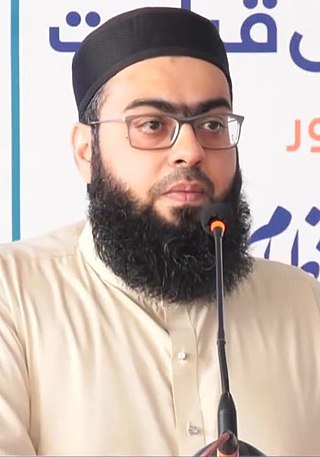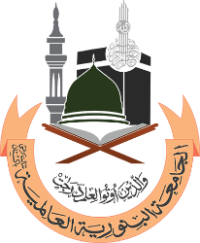
The Darul Uloom Deoband is an Islamic seminary in India at which the Sunni Deobandi Islamic movement began. Uttar Pradesh-based Darul Uloom is one of the most important Islamic seminaries in India and the largest in the world. It is located in Deoband, a town in Saharanpur district, Uttar Pradesh. The seminary was established by Muhammad Qasim Nanautavi, Fazlur Rahman Usmani, Sayyid Muhammad Abid and others in 1866. Mahmud Deobandi was the first teacher and Mahmud Hasan Deobandi was the first student.
Darul uloom, also spelled dar-ul-ulum, is an Arabic term that literally means "house of knowledge". The term generally means an Islamic seminary or educational institution – similar to or often the same as a madrassa or Islamic school – although a darul uloom often indicates a more advanced level of study. In a darul uloom, Islamic subjects are studied by students, who are known as talaba or ṭālib.
Muhammad Rafi Usmani was a Pakistani Islamic scholar who served as the third president of Darul Uloom Karachi. He was an alumnus of Darul Uloom Deoband, University of the Punjab and the Darul Uloom Karachi. He authored books including Ahkām-e-Zakāt, Al-Tālīqāt al-nāfi'ah alā fath al-mulhim, Islām mai aurat ki hukmrāni and Nawādir al-Fiqh. He was a syndicate member of the University of Karachi, vice-president and a member of the executive council of Wifaq-ul-Madaris. His brother Muhammad Taqi Usmani is also a senior scholar.

Darul Uloom Karachi is a Madrasa in Karachi, Pakistan. It was founded by Muhammad Shafi Deobandi in June 1951 at Nanak Wara and later on it transferred to Korangi, Karachi, on March 17, 1957. It continues the tradition of the Darul uloom system initiated by Darul Uloom Deoband. The institution has adopted a balanced approach between religious and worldly matters. The secondary schools have individual faculties for both boys and girls. The school has the highest standards of Islamic education and offers a combined curriculum covering traditional Islamic studies and contemporary academic subjects. It is registered as one of the Islamic Schools under Wifaq ul Madaris Al-Arabia.

Madrassas of Pakistan are Islamic seminaries in Pakistan, known in Urdu as Madaris-e-Deeniya . Most madrassas teach mostly Islamic subjects such as tafseer, hadith, fiqh and Arabic ; but include some non-Islamic subjects, which enable students to understand the religious ones. The number of madrassas grew dramatically during and since the rule of General Muhammad Zia-ul-Haq. They are especially popular among Pakistan's poorest families, in part because they feed and house their students. Estimates of the number of madrasas vary between 12,000 and 40,000. In some areas of Pakistan they outnumber the underfunded public schools.

Mawlānā Muhammad Abdullah Ghazi was a Pakistani Islamic scholar who served as Chairman of Ruet-e-Hilal Committee and as the first Imam and Khatib of Lal Masjid, and founded Faridia University and Jamia Hafsa.

Wifaq-ul-Madaris al-Arabia, Pakistan is the largest federation of Islamic seminaries in Pakistan, founded in 1959. More than 10,000 seminaries and 23,000 madaris across Pakistan are affiliated with the federation. It controls all the seminaries which are run by Deobandi School of thought.

Jamia Dar-ul-Uloom Siddiqia is an Islamic seminary located in the North Karachi area of Karachi, Pakistan. It is considered as one of the most successful Islamic seminary which is dealing in traditional studies of the Quran, Sunnah and Fiqha with modern techniques.
Jamia Uloom-ul-Islamia is an Islamic University in Banoori Town, Karachi, Pakistan. The university continues the tradition of the Darul Uloom system initiated by Darul Uloom Deoband. As of 2007, there are about twelve thousand students in different departments of the Jamiah and its branches, including a number of foreign students from over sixty countries.

Syed Shuja’at Ali Qadri was the first Grand Mufti of Pakistan, Judge of Federal Shariat Court, a member of the Pakistani Council of Islamic Ideology, and a scholar of Islamic Sciences and modern science. He was influenced by Mustafa Raza Khan Qadri.

Jāmi’ah al-Ahmadīyyah is an International Islamic seminary and educational institute with campuses in Pakistan, United Kingdom, India, Ghana, Canada, Germany, Nigeria, Indonesia, Bangladesh, Malaysia, Tanzania, Sri Lanka, Sierra Leone, and Kenya. In addition, there are affiliated Mu'alameen centers in Pakistan and Madagascar. Founded in 1906 as a Section in Madrassa Talim ul Islam by Mirza Ghulam Ahmad of Qadian, the founder of the Ahmadiyya Muslim Community, it is the main centre of the Ahmadiyya Muslim Community for Islamic learning.
Saeed Ahmad Akbarabadi was an Indian Islamic scholar and an Urdu-language author who co-founded the Nadwatul Musannifeen. He served as the dean of the Faculty of Theology in Aligarh Muslim University.
Mufti Muhammad Naeem was a Pakistani cleric and Islamic scholar who served as Chancellor of Jamia Binoria.

Abdur Razzaq Iskander was a Pakistani Islamic scholar and writer. He was the chancellor and senior hadith-professor of Jamia Uloom-ul-Islamia, emir of the Aalmi Majlis Tahaffuz Khatm-e-Nubuwwat and the president of Wifaqul Madaris in Pakistan. He was an alumnus of Darul Uloom Karachi, Jamia Uloom-ul-Islamia, Islamic University of Madinah and the Al-Azhar University. He authored books such as At-Tarīqat al-Asriyyah and Tahafuzz-e-Madāris.
Mufti Zar Wali Khan, was a Pakistani Islamic scholar, writer and Friday sermon preacher. He was the founder and the principal of Jamia Ahsan Ul Uloom.

Jamia Tur Rasheed, Karachi is an Islamic seminary in Karachi, Pakistan. The seminary was established by Rasheed Ahmad Ludhianvi. It is accredited degree awarding institute by Ministry of Federal Education and Professional Training and the Higher Education Commission. The seminary has 36 departments including "Kulyatush Shariyah". It also runs female schools including "Jamia Umm Habībah lil-Banāt", "Jamia Hafsa lil-Banāt" and "Al-Bairuni Girls Secondary School".

Maulana Habibullah Mukhtar was a Pakistani Islamic scholar and writer who served as chancellor of Jamia Uloom-ul-Islamia and General secretary of Wifaq ul Madaris Al-Arabia, Pakistan.

Noman Naeem is a Pakistani Islamic scholar and writer who serves as the chancellor of Jamia Binoria since 23 June 2020.
Majma-ul-Uloom Al-Islamia (MUI) is an educational board jointly established by Jamiat-ur-Rasheed and Jamia Binoria. It was founded on 10 May 2021. The board is officially approved by the Ministry of Federal Education and Professional Training and the Higher Education Commission of Pakistan.










